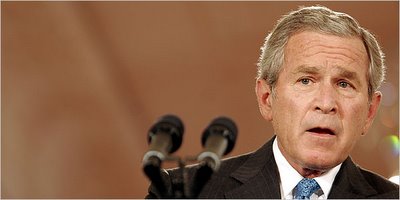A Challenge From Bush to Congress
 Bush has now come clean and admitted that the US has been running secret prisons operated by the CIA in various locations around the world.
Bush has now come clean and admitted that the US has been running secret prisons operated by the CIA in various locations around the world.
One has to wonder how the many on the right who denied this fact will now adjust their positions to deal with this new reality.
The announcement, in the East Room of the White House, was the first time the president had discussed the secret C.I.A. program, and he made clear that he had fully authorized it. Mr. Bush defended the treatment the suspects had received but would not say where the so-called “high-value terrorist detainees” had been held or what techniques had been used to extract information from them.He has now transferred 14 of them to Guantanamo Bay where he hopes they will face "trial". He will now obviously hope that the coming mid-term elections mean that Congress will be forced to give him permission to authorise new military commissions rather than to put the men before an actual jury of their peers.
The timing reveals this to be a cynical use of terror, once again, as a political tool rather than a genuine attempt to keep Americans safe.
Bush is not only attempting to overturn a court decision that went against him, he is also trying to define the mid-term elections in a way that is favourable to the Republicans.For years now, Guantánamo has been a political liability, regarded primarily as a way station for outcasts. By transforming Guantánamo instead into the new home of 14 Qaeda leaders who rank among the most notorious terror suspects, Mr. Bush is challenging Congress to restore to him the authority to put the United States’ worst enemies on trial on terms he has defined.
But the gambit carries with it a potential downside by identifying Mr. Bush even more closely with a detention system whose history has been marked by widespread accusations of mistreatment.
Mr. Bush had more than one agenda at work when he announced on Wednesday that the country should “wait no longer’’ to bring to trial those seized by the C.I.A. and accused of planning the Sept. 11 attacks.
He is trying to rebuff a Supreme Court that visibly angered him in June when it ruled that his procedures for interrogation and trials violated both the Constitution and the Geneva Conventions.
And he is trying to divert voters from the morass of Iraq and to revive the emotionally potent question of what powers the president should be able to use to defend the country.
Mr. Bush must have known that his call for trials would prompt a standing ovation from the relatives of the Sept. 11 victims who were invited to the East Room for the announcement. It did. What he doesn’t know for sure is whether the transfer of Khalid Shaikh Mohammed and other terror suspects will create the pressure on Capitol Hill to give him the legal latitude he says he needs.
“It’s one thing for Congress to argue over abstract rules’’ about approved interrogation techniques and the rules of evidence at military commissions, said one senior administration official who sat in on the debates over how to respond to the Supreme Court ruling in the Hamdan case last June. “But it’s another to say, ‘Once you approve the rules, we put these guys on trial — but it only happens if Congress acts.’ ’’
There is, however, an implicit admission in all of this that - contrary to Bush and Cheney's previous claims - Congress and not the President has the power in this area.
It's just a pity he had to hold such a tawdry gun to Congress' head in order to concede the point.
It was a move that did not surprise Democrats.
“Look, they have won two elections on the basis of terrorism, and that’s the president’s strongest position,’’ said Lee Hamilton, the former Democratic congressman who is now co-chairman of a study group making recommendations to Mr. Bush about how to develop a new Iraq strategy. “And he’s playing to his strength.’’
But it may also force members of Mr. Bush’s party — many of whom have been creating as much strategic distance from the president as possible — to nationalize the midterm elections, making them a referendum on Mr. Bush and his tactics.
It would appear that both Bush and Blair are employing ever riskier tactics as their political authority bleeds from them.
Click title for full article.























No comments:
Post a Comment